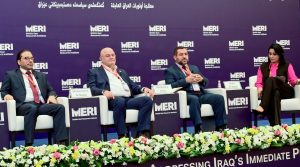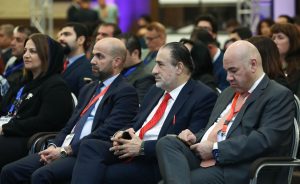The Al-Sudani Cabinet: Pledges, Progress & Prospects
This policy debate was held nearly a year after Mohammed Shia’ Al-Sudani formed his Cabinet, following a vote of confidence in the Iraqi Parliament. The panelists were:
- Aqeel Al-Khazali, Advisor to the Prime Minister of Iraq
- Mohammed Al-Najjar, Advisor to the Prime Minister of Iraq
- Muthanna Amin, Member of Council of Representatives, Iraq
- Noor Al-Majid, Journalist, Iraq 24 (Moderator)
The discussions highlighted that despite an agreement between Baghdad and Erbil and the Prime Minister’s outlined priorities upon assuming his position, progress in Iraq remains sluggish due to structural flaws in the political system.
The panel mentioned that Iraq faces significant sovereignty challenges due to recurring violations, hindering the government’s decision-making and problem-solving abilities. It also highlighted a management deficit and the persistent threat of corruption, jeopardizing political and economic stability. In addressing these challenges, the Sudanese government has taken measures, notably establishing the High Committee for Combating Corruption. Additionally, numerous criminal lawsuits have been filed against high-ranking individuals, indicating effective anti-corruption efforts. Furthermore, the current Iraqi government is actively addressing legislative gaps obstructing anti-corruption initiatives. Legislative amends are being prioritized in areas related to integrity, financial oversight, and criminal trial procedures. While these steps are encouraging, the role of opposition in exposing issues within the political process can motivate government improvements. Collaborative efforts between the government and the opposition are crucial for achieving progress and stability in the country.

The discussion also touched upon the Iraq Development Fund launched six years ago with the aim of enhancing and steering the Iraqi economy towards diversity and sustainability. This Fund aims to use part of oil revenues to finance development projects in vital sectors such as housing, environment, digital transformation, industry, agriculture, and education. By providing financial support and facilitating investments, the fund seeks to rebuild infrastructure and enhance the national economy in collaboration with the private sector.
However, challenges persist in the investment process in Iraq, including legal and bureaucratic obstacles, security issues, and widespread corruption within the country. The government must take necessary steps to improve the investment environment and support local and international investors. Addressing these obstacles and using new investment methods while promoting strategic partnerships can make the Iraq Development Fund a significant contributor to economic development in the country.
The fluctuations in the value of the Iraqi Dinar are linked to the country’s economic and political history. Since the initiation of the war with Iran, financial transactions have shifted towards transfers, bypassing traditional banking channels. Unfortunately, this has exposed vulnerabilities, with certain banks and currency exchangers engaging in corrupt activities and foreign currency smuggling, exerting significant downward pressure on the local currency. Despite efforts to revitalize the financial system and establish an international framework for financial transfers in Iraq, these challenges persist, leaving a toll on effective monetary and economic policies. This raises pertinent questions about the sustainability of the upward trajectory of the Iraqi Dinar value in the near future. The prevalence of these challenges underscores the need for a comprehensive approach to ensure stability and resilience in Iraq’s economic landscape

Therefore, it is important for the Iraqi government to enhance the role of the private sector and make it a prominent driver of economic development. Encouraging investments by launching major projects in various sectors can contribute to economic growth and improve the financial conditions of citizens. However, there is an urgent need to focus on combating corruption, improving financial management, and enhancing the infrastructure of the country to increase the competitive capabilities of the private sector, aiming for sustainable and balanced economic development in Iraq.
The speakers also discussed the relationship between Baghdad and Erbil and the challenges affecting this relationship. It was pointed out that the challenges in this regard are rooted in the incomplete application of the Iraqi constitution. While the constitution states that Iraq is a parliamentary federation, in reality, it is closer to a centralized state with an incongruent federal entity of the Kurdistan Region of Iraq (KRI). The KRI, in turn, sometimes acts beyond what is granted authorities, at times acting as an independent state. This contradiction poses challenges related to interests and constitutional rights, leading to continuous conflicts with the center. Amid observations, critique was levelled against the Iraqi government budgetary management vis-à-vis the KRI, describing its policy as one “starving Kurdistan’s employees.”
Emphasis was placed on the Iraqi government’s attempts to address ongoing challenges. Acknowledgment was made that delays in the budget and alterations to certain provisions have impeded the execution of some administrative measures. To address the financial bottlenecks between Baghdad and Erbil challenges, certain suggestions were proposed, including:
- A comprehensive audit of the numbers of employees in all Iraqi ministries.
- Fair allocation of budgets to cover the salaries of Kurdistan Region employees.
- Establishment of secure and dedicated accounts solely for disbursing employee salaries.
- Ensuring the security of salaries in an account that can only be accessed for salary disbursement purposes.
MERI Forum 2023
Addressing Iraq’s Immediate Priorities
10 & 11 October, 2023
Session : The Al-Sudani Cabinet: Pledges, Progress & Prospects
Session Video

